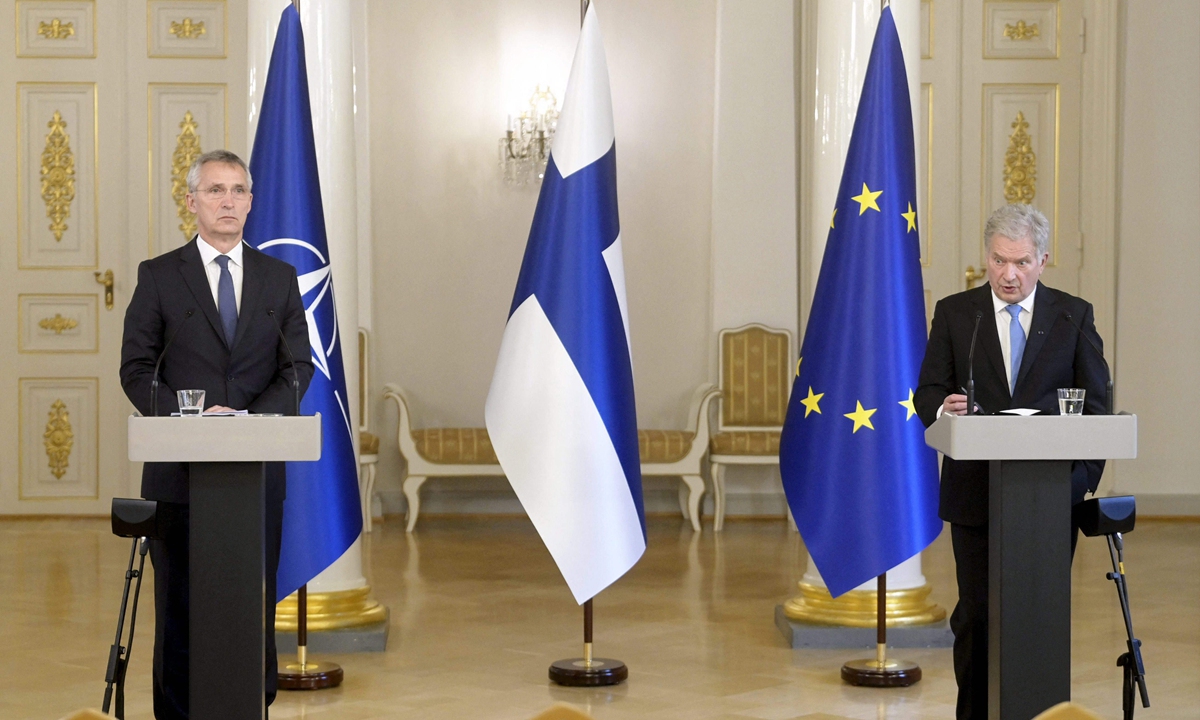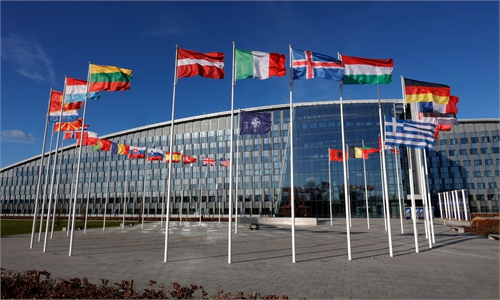NATO northward expansion further threatens Europe, world security as Finland, Sweden on verge of membership bid

On October 25, 2021 NATO Secretary General Jens Stoltenberg (left) and Finland's President Sauli Niinisto address a joint press conference after their meeting during the visit of The North Atlantic Council in Helsinki. Photo: VCG
The president and prime minister of Finland announced on Thursday that Finland, a long-time neutral country even throughout the Cold War, must apply to join the NATO "without delay," and its neighbor Sweden, known for over two centuries of military neutrality when Europe faced turbulence, is expected to decide soon on whether to submit an application to join the alliance.
Russia vowed a symmetrical response to the move, and Chinese observers warned that the further squeezing of Russia's strategic space will not only complicate the ongoing Ukraine crisis but also erode the basis for sustainable security in Europe, even endangering the world given NATO's continuous expansion - in eastward, northward direction and even "Asianization."
Finland President Sauli Niinisto and Prime Minister Sanna Marin announced the country should apply to join NATO. The government will debate the issue over the weekend and the Finnish parliament is expected to give its final approval as early as Monday.
Sweden will likely announce its decision to join this week and NATO allies expect the two countries to be granted membership soon, paving the way for increased troop presence in the Nordic region during the one-year ratification period, Reuters reported.
British Prime Minister Boris Johnson on Wednesday inked defense deals with Sweden and Finland that would see the UK send aid, including military support, in the event of an attack, media reported.
Britain's move silenced people who are opposed to Finland and Sweden's NATO membership citing the possibility of Russian retaliation as a main reason, Cui Hongjian, director of the Department of European Studies at the China Institute of International Studies, told the Global Times on Thursday.
The Kremlin said Finland's bid to join NATO was "definitely" a threat to Russia and the expansion of the military bloc would not make Europe or the world more stable.
Kremlin spokesman Dmitry Peskov said the steps taken by Finland were a cause for regret and a reason to impose a symmetrical response. Russian reactions "depend on how the NATO expansion plays out, and extent to which military infrastructure moves closer to our borders.
Cui said for Finland, joining NATO is mainly defensive and hopefully it will be cautious of NATO deployments in its territories. How the situation will unfold is largely decided by Russian assessment and response: Does NATO's northward expansion increase pressure on strategic security or is it an imminent threat in tactical terms?
Lü Xiang, a research fellow at the Chinese Academy of Social Sciences, said Finnish and Swedish accession was "formality over content," as the two countries already have deep cooperation with NATO.
Finland and Sweden are NATO's most active partners and have been valued contributors to NATO-led operations and missions, according to the NATO website.
The chance of Russian direct confrontation with the Nordic countries is relatively low, as it has Poland and Baltic states to worry about.
Lü said a more possible scenario is that Russia uses the Ukraine crisis as leverage to counter NATO, risking a spillover beyond Ukraine to possibly Poland, a key transit for NATO weapons, and Baltic states, Lithuania in particular, considering its recent harsh remarks against Russia.
The Lithuanian parliament designated Russia as a "terrorist state" and its action against Ukraine "genocide", according to Lithuanian National Radio and Television.
Such remarks are dangerous as they cause "preemptive" countermeasures based on the possibility of future attacks conduced from the current animosity, Lü said.
Dmitry Medvedev, deputy chairman of Russia's Security Council, said in mid-April that should Sweden and Finland join NATO, Russia would have to strengthen its land, naval and air forces in the Baltic Sea, Reuters reported. Medvedev warned of the deployment of nuclear weapons and hypersonic missiles in the Kaliningrad exclave, which is sandwiched between Poland and Lithuania.
Cui believes Russia hopes to use such a deployment to break the pressure and surrounding from the Baltic states and strangling of its estuary.
The three Baltic states have been NATO members since 2002, while Norway and Denmark in the wider Nordic region are also in the military bloc. Finland shares 1,300 kilometers of borders with Russia and its membership in the alliance will double the length of Russia's border with NATO.
The military bloc, a product of the Cold War, did not dissolve after 1991 but pushed its border more than 1,000 kilometers closer to Russia via numerous rounds of enlargements, which sowed the seeds of the current Russia-Ukraine conflict.
The northward expansion of NATO will further threaten the sustainable security of Europe and the world, experts said, also citing the US-led alliance's attempts of dipping its toe in Asia.
NATO for the first time invited Japan and South Korea to its foreign ministers' meeting on April 7, and other attendees included Australia, New Zealand, and Finland and Sweden.



